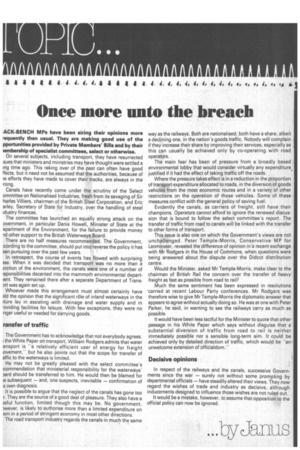Once more unto the breach
Page 71

If you've noticed an error in this article please click here to report it so we can fix it.
;ACK-BENCH MPs have been airing their opinions more requently than usual. They are making good use of the pportunities provided by Private Members' Bills and by their iembership of specialist committees, select or otherwise.
On several subjects, including transport, they have resurrected .sues that ministers and ministries may have thought were settled a )rig time ago. This raking over of the past can often have good ffects, but it need not be assumed that the authorities, because of le efforts they have made to cover their tracks, are always in the frong.
Canals have recently come under the scrutiny of the Select ommittee on Nationalised Industries, fresh from its savaging of Sir harles Villiers, chairman of the British Steel Corporation, and Eric arley, Secretary of State for Industry, over the handling of steel idustry finances.
The committee has launched an equally strong attack on the overnment, in particular Denis Howell, Minister of State at the epartment of the Environment, for the failure to provide money id other support to the British Waterways Board.
There are no half measures recommended. The Government, 1:cording to the committee, should put into reverse the policy it has een pursuing over the past few years.
In retrospect, the course of events has flowed with surprising 3se. When it was decided that transport was no more than a inction of the environment, the canals were one of a number of sponsibilities decanted into the mammoth environmental departlent. They remained there after a separate Department of TransDrt was again set up.
Whoever made this arrangement must almost certainly have eld the opinion that the significant role of inland waterways in the iture lay in assisting . with drainage and water supply and in roviding facilities for leisure. With few exceptions, they were no tnger useful or needed for carrying goods.
ransfer of traffic
The Government has to acknowledge that not everybody agrees.
the White Paper on transport, William Rodgers admits that water ansport is -a relatively efficient user of energy for freight tovement,but he also points out that the scope for transfer of affic to the waterways is limited.
He may not be greatly pleased with the select committee's commendation that ministerial responsibility for the waterways' Dard should be transferred to him. He would then be blamed for le subsequent — and, one suspects, inevitable — confirmation of s own diagnosis.
It is possible to argue that the neglect of the canals has gone too r. They are the source of a good deal of pleasure. They also have a 5eful function, limited though this may be. No government, Dwever, is likely to authorise more than a limited expenditure on tem in a period of stringent economy in most other directions.
The road transport industry regards the canals in much the same way as the railways. Both are nationalised; both have a share, albeit a declining one, in the nation's goods traffic. Nobody will complain if they increase their share by improving their services, especially as this can usually be achieved only by co-operating with road operators. The main fear has been of pressure from a broadly based environmental lobby that would consider virtually any expenditure, justified if it had the effect of taking traffic off the roads. Where the pressure takes effect is in a reduction in the proportion of transport expenditure allocated to roads, in the diversion of goods vehicles from the most economic routes and in a variety of other restrictions on the operation of those vehicles. Some of these measures conflict with the general policy of saving fuel.
Evidently the canals, as carriers of freight, still have their champions. Operators cannot afford to ignore the renewed discussion that is bound to follow the select committee's report. The transfer of traffic from road to canals will be linked with the transfer to other forms of transport.
This issue is also one on which the Government's views are not unchallenged. Peter Temple-Morris, Conservative MP for Leominster, revealed the difference of opinion in a recent exchange with Mr Rodgers in the House of Commons, when questions were being answered about the dispute over the Didcot distribution centre.
Would the Minister, asked Mr Temple-Morris, make clear to the chairman of British Rail the concern over the transfer of heavy ;' freight as fast as possible from road to rail? Much the same sentiment has been expressed in resolutions carried at recent Labour Party conferences. Mr Rodgers was therefore wise to give Mr Temple-Morris the diplomatic answer that appears to agree without actually doing so. He was at one with Peter Parker, he said, in wanting to see the railways carry as much as possible.
It would have been less tactful for the Minister to quote that other. passage in his White Paper which says without disguise that a substantial diversion of traffic from road to rail is neither immediately possible nor a sensible long-term aim. It could be achieved only by detailed direction of traffic, which would be -am unwelcome extension of officialdom.
Decisive opinions
In respect of the railways and the canals, successive Governments since the war — surely not without some prompting by departmental officials — have steadily altered their views. They now regard the wishes of trade and industry as decisive, although inducements designed to influence those wishes are not ruled out.
It would be a mistake, however, to assume that opposition to the official policy can now be ignored.
























































































































